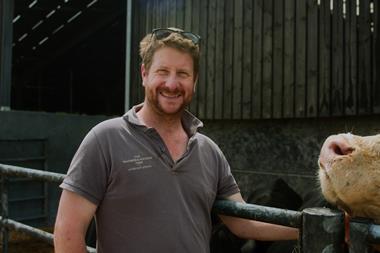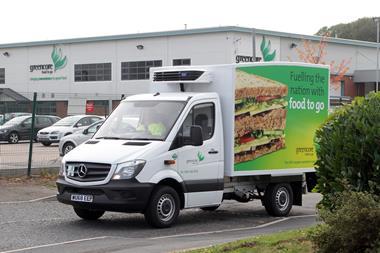
New legislation enabling the widespread adoption of precision breeding technology to increase food production, reduce costs to farmers and allow drought and disease-resistant crops to be grown will be brought forward under new laws, the government has announced.
Minister for food security and rural affairs Daniel Zeichner yesterday said secondary legislation required to unlock the benefits of the Precision Breeding Act will be passed as soon as parliamentary time allows.
Speaking at the World Agri-Tech Innovation Summit in London on Monday, he reiterated government ambitions to press ahead with the controversial bill.
The Genetic Technology (Precision Breeding) Act was first introduced by the Conservative government last year. It was touted as a major post-Brexit regulatory win for the industry, which for years claimed the European Union’s strict laws around gene editing posed an obstacle to innovation.
The Defra minister said on Monday that using technologies like gene editing on plants, precision breeding would enable the development of crops that were more nutritious, resistant to pests and disease, resilient to climate change and more beneficial to the environment.
“Precision breeding technologies, like gene editing, provide the opportunity to really transform the sector by making the breeding process more efficient and precise – it really has the potential to be a key technology for economic growth, food security and sustainability,” Zeichner said.
“As I well know from around Cambridge, the UK has pioneered many crop transformation technologies over the past 30 years. But sometimes the limited opportunities to exploit these technologies commercially have prevented us from reaping the true benefits.”
He noted that while agriculture-related gene editing startups had raised over $2.7bn since 2012, globally, only 5% of venture capital investment had gone to Europe-based companies compared with 80% to US-based companies.
“That’s why it’s critical to drive forward that legislation,” he said, as “it will enable us to realise the opportunities afforded by precision breeding technologies, transforming our regulatory environment, which in turn should attract innovators to start and grow their businesses here”.
Labour ministers are garnering the support of big business ahead of the government’s International Investment Summit on 14 October, which will bring together 300 industry leaders to bolster investment in the UK.
Read more:
-
It’s time for retailers to embrace gene-edited foods
-
Gene editing can improve food security. The UK is falling behind
-
Why we must take a balanced approach to precision breeding
Zeichner told a room full of agriculture and tech stakeholders that gene editing had the potential to increase yields and reduce costs for farmers.
“This government recognises that food security is national security,” said Zeichner. “That is why today we are introducing legislation to unlock precision breeding to boost Britain’s food security, support nature’s recovery and protect farmers from climate shocks.
“With these measures, our agriculture sector will be at the forefront of innovation across the world,” he added.
The measures also promise to reduce the use of pesticides, helping to protect pollinators that are ”vital to our ecosystem” and promoting nature recovery, he said.
Precision-bred products have already started to undergo research trials, including tomatoes with high levels of vitamin D and sugar beet that are less reliant on pesticides.
New legislation will allow greater rollout of these trials and simplify the process for investment and authorisation, Defra said.
The Soil Association, which has been a vocal critic of the bill’s rollout, said it was “disappointed” with Defra’s commitment to push forward with the law ”in spite of public opinion, and the risks this could pose to our ability to trade organic produce”.
CEO Helen Browning told The Grocer that precision breeding – which is not allowed in the organic sector – should not be seen as “the silver bullet” to wider issues like climate change and widespread disease.
She said there were still concerns about gene editing ”being an entirely risk-free technology”, as well as potential cross-contamination of other crops.
The Soil Association wanted strong scrutiny mechanisms in place, Browning said, as it remained concerned about potentially loose labelling and tracking requirements of precision-bred organisms along the supply chain.
It urged the government to introduce a robust notification and registration system for gene-edited products to ensure that only products that meet the requirement of the bill are being declared as PBOs.
It also said it wanted to see ”appropriate risk assessments in place” – including risks to the environment, biodiversity and animal welfare – of the genetic changes taking place before the products can be sold as food and feed.
All products containing GE ingredients should also be properly labelled at the point of sale to ensure both consumers and supply chains could make a choice of whether to use them or not, the group argues.
Soil Association director of policy, Brendan Costelloe, added in response to Defra’s announcement: “It is vital to both consumer confidence and the organic sector that the right statutory instruments are now put in place ensure full transparency of PBOs with clear labelling to reassure and protect consumer choice, secure the organic and GMO Free sector and protect trade.
“We are absolutely determined to work with Defra to deliver these reassurances,” Costelloe said.
“This is critical for the entire organic food sector to maintain the legal standards required and to ensure that the thousands of organic businesses in the UK can trade with Europe and with other countries who have exclusions on genetically modified organisms including PBOs. We must avoid any barriers to consumer choice and trade at all costs.”



















No comments yet